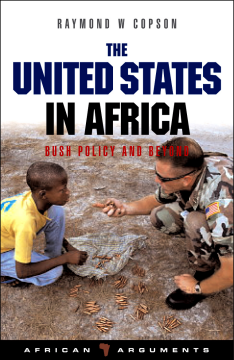
Additional Information
Book Details
Abstract
The George W. Bush administration maintains that in sub-Saharan Africa it is making major new contributions in fighting disease, promoting development, fostering democracy, and promoting peace. Yet, despite the rhetoric, is the Bush Administration really working to bring about a fairer and more just Africa?
Though aid has increased and a major AIDS initiative launched, Copson argues that US policy in Africa falls well short of meeting reasonable standards of fairness or justice. Foreign aid is losing its focus on development as political priorities come to the fore; U.S. barriers to African exports remain substantial; and the AIDS program is in danger of flagging due to unilateralism and ideological controversy. An increasingly military approach to fighting the 'Global War on Terror' in Africa and securing energy imports carries serious risks for the region. Copson concludes by assessing the prospects of a more equitable policy emerging in future administrations.
'Ray Copson casts a dispassionate eye on recent U.S. policy toward Africa - on trade, development aid, support for democracy, counter terrorism, and HIV-AIDS - and lays bare the gap between high-flown rhetoric and the often disappointing reality. An essential book.'
Jon Sawyer, Director, Pulitzer Center on Crisis Reporting
‘Copson provides a fascinating insight into an area of foreign policy which has major implications for both Africa and America. This book’s fairness and moral clarity make it compulsory reading.’
Congressman Donald M. Payne
'Raymond Copson's analysis is rigorous and his approach to policy-making is promising. This book needs to be read by all concerned about Africa.'
Marcel Kitissou, George Mason University
Raymond W. Copson is an independent scholar specializing in African affairs and U.S. relations with Africa. He teaches at the Johns Hopkins University School of Advanced International Studies and at the George Washington University's Elliott School of International Affairs. Copson is editor of the Online Africa Policy Forum at the Center for Strategic and International Studies. Until 2005, he worked at the Congressional Research Service of the US Library of Congress. He has previously lectured in international relations at the University of Nairobi, Kenya, and the University of Ibadan, Nigeria.
Table of Contents
| Section Title | Page | Action | Price |
|---|---|---|---|
| Contents\r | v | ||
| 1 | Introduction | 1 | ||
| Fairness and justice in Africa policy | 2 | ||
| Realism and neoconservatism in Africa policy | 5 | ||
| The idealist influence in Africa policy | 8 | ||
| Other influences on policy | 14 | ||
| Conclusion | 16 | ||
| 2 | Aid, trade, and development: policy improvements less than advertised | 17 | ||
| Assistance programs | 19 | ||
| Millennium Challenge Account | 27 | ||
| Transformational development? | 29 | ||
| Trade and investment policy | 33 | ||
| Debt | 39 | ||
| Conclusion | 41 | ||
| 3 | AIDS policy: substantial new program weakened by unilateralism and controversy | 42 | ||
| Pressure builds | 43 | ||
| PEPFAR is launched | 45 | ||
| Global Fund: victim of unilateralism | 50 | ||
| Contributing far less than needed | 53 | ||
| Abstinence, condoms, and the prostitution pledge | 56 | ||
| Conclusion | 63 | ||
| 4 | Democracy and human rights: strong rhetoric, few deeds | 66 | ||
| The rhetoric/reality gap | 68 | ||
| Democracy policy in practice | 71 | ||
| Democracy promotion programs | 80 | ||
| Conclusion | 84 | ||
| 5 | Conflict and peacekeeping: limited efforts, low priorities | 86 | ||
| Limited diplomatic efforts | 89 | ||
| Parsimony in peacekeeping | 95 | ||
| Post-conflict recovery | 108 | ||
| Conclusion | 109 | ||
| 6 | Threats to security: caution needed in the US response | 110 | ||
| US security assistance initiatives | 111 | ||
| Threats and risks | 114 | ||
| Conclusion | 124 | ||
| 7 | Beyond the Bush administration: toward a fairer and more just Africa policy | 126 | ||
| New secular voices | 132 | ||
| Voices in the faith-based community | 136 | ||
| Time for a China/US dialogue on Africa policy | 141 | ||
| Conclusion | 144 | ||
| Notes | 146 | ||
| Index | 163 |
